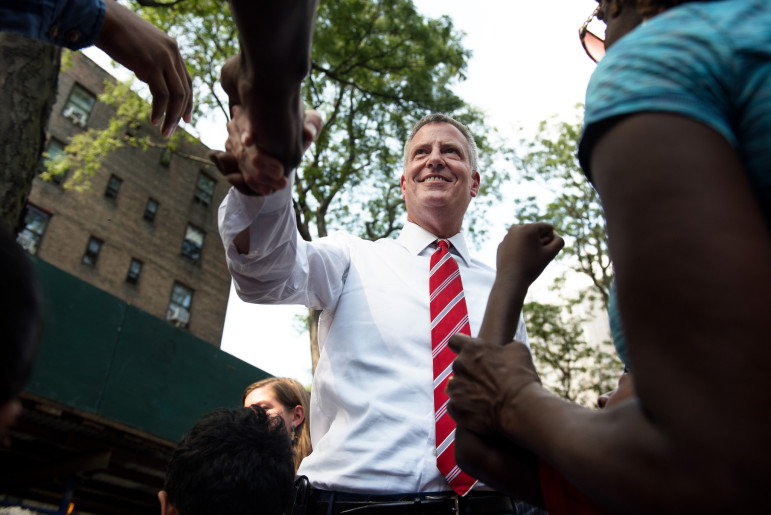
Demetrius Freeman/City Hall
The press has to hold Mayor de Blasio accountable for his promise to address economic injustices like homelessness. But Mayor Bloomberg made promises about homelessness, too.
It’s great that New York City is talking about so much about homelessness these days. Sure, some of the talk has been cruel or crass. And yes, it’s hard to know just how big a problem we’re discussing, because it’s difficult to measure homelessness accurately. But we certainly know it is a very big problem, and therefore something the local press has a duty to talk about.
It’s worth noting, though, just how much more we are talking about homelessness now than in the recent past.
During the course of Mayor Bloomberg’s final term, from January 2010 through December 2013, the monthly average number of families with children in the city’s shelter system grew 20 percent. The number of adult families rose 46 percent and the number of single adults climbed 38 percent.
So far under Mayor de Blasio, the increases in those categories are 10 percent, 12 percent and 18 percent. Those are substantial increases, and occurred over a shorter time, but they are plainly far below what we saw during the third Bloomberg term.
But press interest in homelessness has hardly been proportional. Over the entire final Bloomberg term, according to the news database LexisNexis, the New York Times ran 38 items that mentioned “Mayor Bloomberg” and “homelessness;” it’s run 45 mentioning homelessness and de Blasio during de the current mayor’s time in City Hall.
The Daily News ran 186 such items from 2010-2013 and 167 since de Blasio took the oath. And the New York Post? During Bloomberg III, 95 items. In the first 20 months of the de Blasio administration, there have been 105.
No doubt, “mentions in print” is a crude measure of how much weight a news outlet is giving to a story: The Times’ Dasani Coates series was a much bigger blow to Bloomberg’s legacy than the paper’s brief story yesterday on Lilliam Barrios-Paoli’s departure will be to de Blasio’s. And of course, sometimes mayors drive press coverage about homelessness by announcing policies to combat it, as de Blasio has on several occasions in his mayoralty. Not every “homelessness” story is a black mark on a mayor.
The point isn’t that homelessness was Mike Bloomberg’s fault, that de Blasio doesn’t deserve to be held to a higher standard because of the progressive critique he rode to office, that the current mayor’s measures to address homelessness don’t deserve scrutiny or that the press ought to be talking less about homelessness to somehow even the score between the two mayors.
The point is this: To the extent that the extra press coverage forces political attention and policy debate, it’s a good thing. But if the mere existence of more noise around the homelessness issue becomes, instead, a cudgel to invalidate de Blasio’s broader program, then that’d be unfair—not just to the mayor, but to the tens of thousands of people who were in crisis long before he took office or the press began to pay serious attention.








2 thoughts on “Homelessness Headlines Dog de Blasio More Than Bloomberg”
Should we hold Mayor De Blasio “accountable” for an uncooperative Albany cabal, for lack of funding, for decades of neglect, for insufficient and inept Federal policies, and for an inhumane and undemocratic economic system? Is there nothing else we can falsely hang on the neck of our first real progressive Mayor in ages? ..the first Mayor in years who cares about ALL his constituents? The phrase “Love thy neighbor” is much more than a cute cliche. It’s the true meaning of community, of our community. Especially if our neighbors are poor, hungry or homeless. These people desperately need our healing and our help – not our harsh words of hatred and harassment. For if YOU were in their tattered shoes; if YOU lived their shattered lives, then YOU would hope and pray and plead for compassion and understanding; YOU would hope and pray and plead that when YOU fell, people would help to lift you up – instead of kicking you further and further down. Yet, all too often our shameful response is to simply “sweep” them off our streets, out of sight, out of mind. What kind of society, what kind of community, and what kind of people are we – IF we close our eyes, IF we turn away, and IF we let people die on our street corners, in our parks..and ..in our hearts? IF we let that happen, then ask not for whom the bell tolls, dear neighbors. It tolls for thee….
Anyone with common sense knows Bloomberg is responsible for the homeless. The media, politicians and fools dumb enough to keep blaming DeBlasio are just that; dummies.